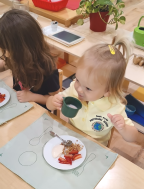Key Principles
1. Freedom of movement to interact with peers and choose activities that nurture the excitement of learning. Maria Montessori saw freedom as the single most important factor in allowing children to develop as spontaneous, creative individuals.
2. Children naturally love to learn and are intrinsically motivated.
3. The prepared environment is essential. The classroom is a responsive environment prepared with multisensory, sequential, and self-correcting materials to support self-directed learning and the development of independence. The focus is on the process, not the results.
4. Children learn at their own pace and level. Individual and small group instruction enables the child to learn at his or her own pace, with tailored instruction for each child. Through such individualized instruction, teachers are able to develop strong relationships with their students by understanding each child’s strengths and challenges and how to further unlock their potential.
5. Montessori focuses on the similarities in people which leads to understanding and peace. The curriculum emphasizes the integration of geography, history, world cultures, community service, and peace education. Through the exploration of cultures, children gain a basic global perspective and begin to understand issues facing all of humanity.
6. Our children practice stewardship of the earth through integration of the “green curriculum.” Students learn that we, as humans, are the custodians of the earth and have a responsibility for the environment that sustains life.
7. Freedom and self-discipline become parallel paths. Self-discipline is acquired gradually through absorption in meaningful work. The child is guided by respect for the teacher, for the work of others, and for the materials themselves. The freedom to use our innate powers to develop physically, intellectually, and socially is what leads to growth of the human spirit. A Montessori classroom provides this freedom within the limits of an environment that encourages a sense of order and self-discipline. Children thrive on order and structure, but need freedom within that order to explore and learn.
8. All classes are multiage. In a three-year period, children experience being the youngest, the middle, and the oldest in the community. At different stages and moments, students learn from other students and practice with them as well. At other times, students teach other students. In this way, students reinforce their own learning and master skills while helping others.


